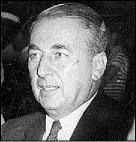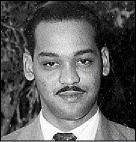Arnold Bertram, Contributor

Abe Issa and William 'Wills' Isaacs
In the first decade of its existence, the People's National Party (PNP) adopted the ideology of socialism and conceived of Jamaica's economic development on the basis of the subordination of the private sector to the State, and expressed its reservations about direct foreign investment. Simultaneously, the party's trade union affiliate, the Trade Union Congress (TUC), orchestrated a militant assertion of workers' rights. As a consequence, the relationship between the PNP and the private sector was characterised by suspicion and hostility.
The following excerpt from the PNP's platform for the 1949 election showed the extent to which Norman Manley had changed his views on economic policy.
Manley changed course
"Jamaica's economic back-wardness ... is due in large measure to lack of large capital ... for an effective programme of industrial expansion. Private Jamaican capital investment will be attracted by suitable tax concessions and other favourable inducements ... and inducements to attract the direct investment of private foreign capital will be adopted."
However, Ken Hill, the leader of the Marxist left within the PNP, was not as enthusiastic as Manley about the new role for the private sector. In his election-campaign manifesto, Hill appealed to the voters of Western Kingston: "I come not to call the capitalist employers to champagne parties, but to call the workers to redeem their rights given to them by God and history through eternity."
Manley's modified views on economic development were largely influenced by the Caribbean's most eminent economist, Arthur Lewis, who had been recruited as an economics adviser on colonial economic development by the post-war British government.
The 1943 a labour survey showed Jamaica's labour force at 505,000, of which 80,000 were domestic workers, working for wages as marginal as most of the 228,000 in agriculture. The unemployed numbered 139,000 or 25 per cent of the labour force, and another 54,000 seeking employ-ment, had never worked. It was in the context of these realities that Lewis recommended incentives to attract direct foreign investment for the manufacture of those commodities which would reduce the import bill and absorb the surplus labour. Simultaneously, he argued for the modernisation of agriculture to provide the wage increases which would allow workers in that sector to buy not only food and shelter, but manufactured goods as well.
Lewis warned that only by producing for export could a manufacturing sector be sustained, since the local market was too small to generate the surpluses required for modernisation. He also insisted on sustained investments in education and training as a priority so as to maintain the relationship between productivity and wages.
Cold war and Jamaica
Norman Manley's conversion to the need for 'industrialisation by invitation' coincided with the intensification of the 'cold war' as the United States and the Soviet Union contended for domination of the world's political and economic system. The international struggle between world communism and international capitalism was about to affect Jamaican politics.
The strategic importance of bauxite to the U.S. was clearly stated in a letter from the vice-president of Reynolds Metals to the U.S. Secretary of State: "... We know of no ore discovery in recent years of comparable strategic importance, we believe the freedom to mine and ship bauxite from Jamaica to the United States is vitally important to the industrial future of our country and our national security."
A most productive alliance
On the eve of the first shipment of bauxite from Jamaica, the Americans would have been concerned that the bauxite workers were represented by the TUC, a union with links to the World Federation of Trade Unions, which the U.S. perceived as a tool of international communism. The results of the 1949 election convinced Norman Manley that the communist label which had stuck to the PNP as a result of the activities of its Marxist left wing, constituted an insurmountable obstacle to the party's chances of electoral success.
In March 1952, the PNP expelled its Marxist left and the following month announced the establishment of a new union - the National Workers' Union (NWU) - to replace the TUC as the party's labour affiliate.
Manley's conversion to private sector-led economic development, along with the expulsion of the Marxist left from the PNP, laid the basis for a new relationship between the PNP and the private sector, and the formation of a most interesting alliance with Alexander Bustamante and the new British Governor, Sir Hugh Foot. It was Manley's vision of economic development and this alliance which laid the basis for the decade of unprecedented economic expansion which followed.
Their first success came in June 1951 with the passage of legislation for the creation of the Agricultural Development Corporation, which Manley had advocated for years. The economy received an impetus with the programme of reconstruction, presided over by Foot, following the devastation by Hurricane Charlie in August, 1951. International assistance "brought in three quarters of a million, and nearly £5 million pounds were given by the British Government mainly in free grants and the rest in interest-free loans. A stimulus was given to new development, and the impetus carried Jamaica into a new era of economic expansion," Foot stated in his book, A Start in Freedom.
In February 1952, Manley persuaded the JLP administration to establish an industrial development corporation on the basis that "private enterprise ... has to be stimulated, has to be aided and has to be encouraged," wrote Rex Nettleford in his book, Manley and the New Jamaica. Beginning in 1952, Jamaica recorded an average GDP growth of 11.5 per cent for three years.
economic expansion
The PNP's victory in the 1955 election gave Manley, as Premier, the opportunity to implement even more fully his programme of private sector-led development. Perhaps the major factor which contributed to the unprecedented economic expansion during Manley's administration (1955-1959), was his decision to recruit the best talent available, irrespective of nationality or political affiliation.
The Minister of Finance, Noel Nethersole, enjoyed the confidence of private sector leadership, with whom he had fraternised as members of the Kingston Cricket Club and as captain of the cricket team. Nethersole also had links with members of the British government whom he had met during his undergraduate years at Oxford, where he attended as a Rhodes Scholar and distinguished himself in cricket.
To lead the critical Ministry of Trade and Industry, Manley named businessman Wills Isaacs. His advisor on the establishment of the Central Planning Unit was United Nations economist and planner, George Cadbury. Manley also engaged the services of Samuel Moment, a marketing economist in the US aluminium industry to advise him on his negotiations with the bauxite companies. To complete the team he promoted two young, bright Jamaicans, Egerton Richardson to the position of Financial Secretary, and G. Arthur Brown as Director of the Central Planning Unit.
Golden age of tourism
Manley's first order of business was the renegotiation of the 1950 agreement with the bauxite industry to include an escalator clause whereby one half of the total income tax and royalty would vary with the price of aluminum itself. The assumed rate of profit was increased from 60 cents a ton to $3.85 for income tax, and the old royalty from 10 cents to 40 cents. These new inflows wiped out Jamaica's trade deficit of £18 million overnight.
Abe Issa, a pioneer in the tourist industry, who had been a candidate for the Jamaica Democratic Party (JDP) in 1944 and had since joined the JLP, became Manley's chief advisor on tourism. It was he who convinced Wills Isaacs to promote tourism as the island's biggest business. The Tourist Board was re-structured and the subsequent increase in visitor arrivals made the period the 'golden age' of tourism.
While the Issas were promoting tourism, the Matalons acquired 150 acres of land at Mona, St. Andrew and completely revolutionised the housing sector by introducing the concept of 'turn-key' development which relieved the homeowner of all the complexities of construction. The developer acquired the land, constructed the unit, arranged the mortgage financing, prepared the documentation for titles, and at the end of the day handed over a set of keys to the new owner.
Between 1955 and 1957 GDP grew at an average of 12.2 per cent and in a radio broadcast on November 10, 1957, Manley was able to report that: "The Jamaican economy is expanding at a rate faster than that of most countries in the world. Actually, at a faster rate than any other West Indian island, at a faster rate than Puerto Rico or England, or the United States or even Canada".
In the 1959 election, a significant part of the private sector voted with the working class to secure a second term for the PNP, which won 29 of the 45 seats and increased its percentage of the popular vote to 54.8 percent as a record 66.09 per cent of the electorate polled their votes.
Postcript
Manley's partnership with the private sector might have produced even more spectacular results were it not for the disintegration of his critical alliance. Foot's term of office came to an end in 1957, Nethersole died in 1959 and Bustamante and himself divided on the question of Federation in 1961. The capitalist class would also have had less confidence in Nethersole's successor, Vernon Arnett, a man with impeccable socialist credentials. The JLP came to power in 1962 and continued the economic model, achieving economic growth even as the social fabric of the society deteriorated leading to social unrest. The stage was set for the emergence of Michael Manley and the appeal of Democratic Socialism.
Arnold Bertram, a historian and former Minister of Government, is currently Chairman and CEO of Research and Project Development Ltd. E-mail: redev.atb@gmail.com

